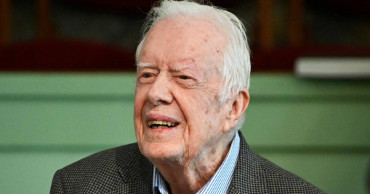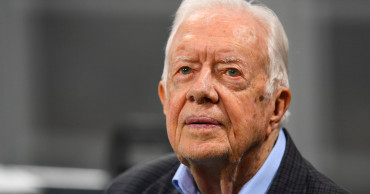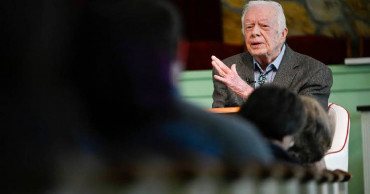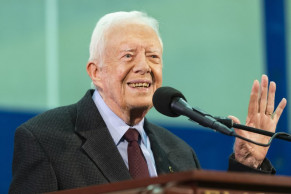Jimmy Carter
Jimmy Carter's funeral brings together 5 current, former US presidents to honor him
As they filed into the front pews at Washington National Cathedral, wearing dark suits and mostly solemn faces, five current and former presidents came together for Jimmy Carter's funeral. During a service that stretched more than an hour, the feuding, grievances and enmity that had marked their rival campaigns and divergent politics gave way to a reverential moment for one of their own.
Barack Obama and Donald Trump, the first two of the group to take their seats Thursday, shook hands and chatted at length. Trump, the former president who will retake the Oval Office in 11 days, leaned in and listened intently to his predecessor, notwithstanding the political chasm between them. At times, the two flashed smiles.
Trump later returned to his Mar-a-Lago club in Florida Thursday night to meet with Republican governors and refused to say what he and Obama discussed, but joked, “It did look very friendly, I must say.”
“I didn’t realize how friendly it looked. I said, 'Boy they look like two people who like each other and we probably do," he said. "We have little different philosophies, right, but we probably do."
The president-elect added, “I don’t know. We just got along. But I got along with just about everybody.”
Obama, who attended Carter's funeral without his wife, Michelle, shared a second-row pew with former presidents George W. Bush and Bill Clinton, along with their spouses. President Joe Biden and first lady Jill Biden arrived last and sat in the pew just in front of them.
Members of the exclusive presidents' club were on their best behavior. Bonded by the presidency, they rarely criticize one another or the White House’s current occupant — though Trump has flouted those rules frequently. He has both praised and criticized Carter in recent days, and he complained that flags will still be at half-staff to honor the deceased president during his inauguration.
In one seemingly chilly moment, Trump looked up when Vice President Kamala Harris — whom he defeated in November's hard-fought election — entered the cathedral, but he didn't move to greet her as she and husband Doug Emhoff took seats directly in front of him and Melania Trump. Nor did Harris acknowledge him.
After the service, Emhoff made a point to turn around and shake hands with Trump.
Obama, with Trump on his left, also turned to his right to chat with Bush. Clinton, with wife Hillary, was the last of the ex-presidents to take a seat and got in some chatter with Bush as well.
The White House said the former presidents also met privately before taking their seats. There was no word on what was said then, though Trump said later of its participants, "We all got along very well.”
Funerals are among the few events that bring members of the presidents' club together. In a way, former President Gerald Ford was there, too: Ford's son Steven read a eulogy for Carter that Ford had written before he died in 2006.
Read: Jimmy Carter made eradicating Guinea worm disease a top mission
Busy with personal pursuits, charitable endeavors and sometimes lucrative speaking gigs, the former leaders don’t mingle often. They all know the protocol of state funerals well — each has been involved in planning his own.
During the 2018 funeral for George H.W. Bush, then-President Trump sat with his predecessors and their spouses, including the Carters, and the interactions were stiff and sometimes awkward.
This time, Trump also didn't appear to interact with Hillary Clinton, whom he defeated in the 2016 election.
Trump was seated in the pew in front of his former vice president, Mike Pence — one of the few times they have coincided at events since Pence refused to overturn the results of the 2020 election after Trump lost to Biden. The two shook hands but didn't speak much beyond that. Pence's wife, Karen, appeared to avoid engaging with the president-elect.
Trump, who largely avoided contact with the former presidents during his first term — and pointedly did not seek their advice — has been critical of Republican former presidents, particularly the Bush family, which made him an uneasy member of the former presidents' club. Carter himself didn't particularly relish being a member of the club, at times criticizing its staid traditions.
Many past presidents have built relationships with their predecessors, including Bill Clinton, who reached out to Richard Nixon for advice on Russian policy, and Harry S. Truman, who sought counsel from Herbert Hoover.
One of the first calls Obama made after U.S. forces killed Osama bin Laden in 2011 was to George W. Bush to spread the word that the mission had been accomplished, said Kate Andersen Brower, author of “Team of Five: The Presidents Club in the Age of Trump.”
“It's the loneliest job in the world, so usually they reach out and rely on each other," said Andersen Brower. "But Trump didn't have that the first term, so this will just be another four years where he doesn't depend on anyone who came before him."
She noted that Carter spent years as a proud Washington outsider and skipped the unveiling of his own portrait to avoid being in the same room with the man who beat him in 1980, President Ronald Reagan.
Read more: Jimmy Carter was a true friend of Bangladesh: Dr Yunus
“Carter and Trump, even though they have the least in common about everything else, are similar," Andersen Brower said, "in just how they approach telling what they actually think.”
1 year ago
Jimmy Carter made eradicating Guinea worm disease a top mission
Jimmy Carter’s Legacy: A Nearly Four-Decade Battle Against Guinea Worm Disease
Former U.S. President and Nobel laureate Jimmy Carter dedicated nearly 40 years to eradicating Guinea worm disease, a parasitic affliction that once plagued millions in some of the world's poorest regions.
Carter, who passed away Sunday at the age of 100, made the fight against the disease a priority for The Carter Center, the nonprofit he co-founded with his wife, Rosalynn, after leaving the White House. His efforts have brought the disease to the brink of eradication, with only 14 human cases reported across four African nations in 2023, down from 3.5 million cases in 20 countries in 1986 when the campaign began.
Chief Astronaut of NASA to visit Bangladesh first time
The World Health Organization aims to declare Guinea worm eradicated by 2030, but The Carter Center hopes to achieve this milestone even sooner.
A Painful Disease
Guinea worm disease, while rarely fatal, causes excruciating pain and disability. The parasite infects individuals who drink contaminated water. The larvae grow into worms up to three feet long, eventually emerging through painful blisters on the skin. Treatment, unchanged since ancient times, involves slowly removing the worms, a process that can take weeks.
58 Nasaka members forced to take shelter in Bangladesh as Arakan Army overrun them in Rakhine
The Carter Center’s strategy focused on breaking the parasite's life cycle by promoting simple preventive measures, such as filtering drinking water and isolating infected individuals from water sources.
Mobilizing Resources
Carter leveraged his influence to rally donors, public health experts, and political leaders. The campaign became a model for combating neglected tropical diseases, helping 22 countries eliminate at least one disease within their borders. In 2023, Mali eradicated trachoma, a blinding eye infection, under The Carter Center’s guidance.
Personal Commitment
Carter’s firsthand experiences with the disease motivated his mission. During a visit to Ghana in 1988, he witnessed a young woman suffering as a worm emerged from her breast. This moment underscored the need for urgent action.
The former president’s visits to affected regions and relentless fundraising brought global attention to the issue. The center invested $500 million in the eradication campaign, distributing water filters, larvicides, and other resources to affected communities.
Challenges and Progress
The campaign faced setbacks, including civil wars and natural disasters that disrupted operations. In 1995, Carter negotiated a ceasefire in South Sudan to ensure aid delivery, a move that not only reduced Guinea worm cases but also fostered trust among warring communities.
NASA's Parker Solar Probe aims to fly closer to the sun like never before
Despite challenges, the campaign achieved remarkable milestones. Pakistan eliminated the disease in 1993, followed by India. By 2003, cases worldwide had dropped by 99%. Countries like Ghana and Nigeria, once epicenters of the disease, eradicated it by 2010.
The Final Push
Although cases are now rare, challenges remain. Civil unrest, flooding, and infections in animals, particularly dogs in Chad, complicate eradication efforts.
Carter’s vision of eliminating Guinea worm disease remains a driving force for The Carter Center, which continues to rely on thousands of volunteers across affected regions. “The Carter Center is committed to this, no matter what,” said campaign director Adam Weiss.
Carter once expressed his desire to see the last Guinea worm die before him. While that goal wasn’t realized, his legacy endures in the near-eradication of a disease that once seemed insurmountable.
1 year ago
Jimmy Carter was a true friend of Bangladesh: Dr Yunus
Chief Adviser Prof Muhammad Yunus on Monday said Nobel Laureate and former US President Jimmy Carter was a true friend of Bangladesh and the relationship between the two countries was strengthened during his Presidential tenure and beyond.
With profound sadness, Dr Yunus wrote to US President Joe Biden, extending his heartfelt condolences on the passing away of Carter, noting that he was a "remarkable leader, a champion of human rights, and a tireless advocate for peace and democracy" across the globe.
Former US President Carter - who rose from humble beginnings as a peanut farmer - has died aged 100.
Dr Yunus mourns ex-President Jimmy Carter’s death
His work in Bangladesh through the Carter Center, particularly in empowering women, ensuring good governance, and advancing democracy, stands as a testament to his love and passion for the people of Bangladesh, said the Chief Adviser.
"We fondly recall his visit to Bangladesh in 1986 and that was a source of great inspiration for our people," Dr Yunus said.
"Over the years, I had the distinct honor of meeting him on numerous occasions at the gatherings of Nobel Laureates," said the Chief Adviser.
"Our conversations were marked by his deep humility, wisdom, and firm belief in the empowerment of people. There is no doubt that his legacy will continue to inspire generations to come," said the Chief Adviser.
Jimmy Carter: Many evolutions for a centenarian ‘citizen of the world’
On behalf of the government and the people of Bangladesh, Dr Yunus expressed their deepest condolences to the people of the United States and particularly to the bereaved family of President Carter.
"We also pray for the salvation of his departed soul," he said in a message of condolence.
1 year ago
39th US President Jimmy Carter dies at 100
Jimmy Carter, the peanut farmer who tried to restore virtue to the White House after the Watergate scandal and Vietnam War, then rebounded from a landslide defeat to become a global advocate of human rights and democracy, has died. He was 100 years old.
The Carter Center said the 39th president died Sunday afternoon, roughly 22 months after entering hospice care, at his home in Plains, Georgia, where he and his wife, Rosalynn, who died in November 2023, lived most of their lives. The center said he died peacefully, surrounded by his family.
President Joe Biden mourned Carter’s death, saying the world lost an “extraordinary leader, statesman and humanitarian” and he also lost a dear friend. Biden cited Carter’s work to eradicate disease, forge peace, advance civil and human rights, promote free and fair elections and house the homeless as an example for others.
Biden spoke later Sunday evening about Carter, calling it a “sad day” but one that “brings back an incredible amount of good memories."
“I’ve been hanging out with Jimmy Carter for over 50 years,” Biden said in his remarks.
He recalled the former president being a comfort to him and his wife Jill when their son Beau died in 2015 of cancer. The president remarked how cancer was a common bond between their families, with Carter himself having cancer later in his life.
“Jimmy knew the ravages of the disease too well,” said Biden.
The president has ordered a state funeral for Carter in Washington.
A moderate Democrat, Carter ran for president in 1976 as a little-known Georgia governor with a broad grin, effusive Baptist faith and technocratic plans for efficient government. His promise to never deceive the American people resonated after Richard Nixon’s disgrace and U.S. defeat in southeast Asia.
Read: Biden says Jimmy Carter has asked him to deliver his eulogy
“If I ever lie to you, if I ever make a misleading statement, don’t vote for me. I would not deserve to be your president,” Carter said.
Carter’s victory over Republican Gerald Ford, whose fortunes fell after pardoning Nixon, came amid Cold War pressures, turbulent oil markets and social upheaval over race, women’s rights and America’s role in the world. His achievements included brokering Mideast peace by keeping Egyptian President Anwar Sadat and Israeli Prime Minister Menachem Begin at Camp David for 13 days in 1978.
But his coalition splintered under double-digit inflation and the 444-day hostage crisis in Iran. His negotiations ultimately brought all the hostages home alive, but in a final insult, Iran didn’t release them until the inauguration of Ronald Reagan, who had trounced him in the 1980 election.
Humbled and back home in Georgia, Carter said his faith demanded he keep doing whatever he could, for as long as he could, to try to make a difference. He and Rosalynn co-founded The Carter Center in 1982 and spent the next 40 years traveling the world as peacemakers, human rights advocates and champions of democracy and public health.
Awarded the Nobel Peace Prize in 2002, Carter helped ease nuclear tensions in North and South Korea, avert a U.S. invasion of Haiti and negotiate cease-fires in Bosnia and Sudan. By 2022, the center had monitored at least 113 elections around the world. Carter was determined to eradicate guinea worm infections as one of many health initiatives. Swinging hammers into their 90s, the Carters built homes with Habitat for Humanity.
The common observation that he was better as an ex-president rankled Carter. His allies were pleased he lived long enough to see biographers and historians revisit his presidency and declare it more impactful than many understood at the time.
Propelled in 1976 by voters in Iowa and then across the South, Carter ran a no-frills campaign. Americans were captivated by the earnest engineer, and while an election-year Playboy interview drew snickers when he said he “had looked on many women with lust. I’ve committed adultery in my heart many times,” voters weary of political cynicism found it endearing.
The first family set an informal tone in the White House, carrying their own luggage, trying to silence the Marine Band’s traditional “Hail to the Chief" and enrolling daughter Amy in public schools. Carter was lampooned for wearing a cardigan and urging Americans to turn down their thermostats.
But Carter set the stage for an economic revival and sharply reduced America's dependence on foreign oil by deregulating the energy industry along with airlines, trains and trucking. He established the departments of Energy and Education, appointed record numbers of women and nonwhites to federal posts, preserved millions of acres of Alaskan wilderness and pardoned most Vietnam draft evaders.
Read more: After brain surgery, Jimmy Carter returns to hometown church
Emphasizing human rights, he ended most support for military dictators and took on bribery by multinational corporations by signing the Foreign Corrupt Practices Act. He persuaded the Senate to ratify the Panama Canal treaties and normalized relations with China, an outgrowth of Nixon’s outreach to Beijing.
But crippling turns in foreign affairs took their toll.
When OPEC hiked crude prices, making drivers line up for gasoline as inflation spiked to 11%, Carter tried to encourage Americans to overcome “a crisis of confidence.” Many voters lost confidence in Carter instead after the infamous address that media dubbed his “malaise" speech, even though he never used that word.
After Carter reluctantly agreed to admit the exiled Shah of Iran to the U.S. for medical treatment, the American Embassy in Tehran was overrun in 1979. Negotiations to quickly free the hostages broke down, and then eight Americans died when a top-secret military rescue attempt failed.
Carter also had to reverse course on the SALT II nuclear arms treaty after the Soviets invaded Afghanistan in 1979. Though historians would later credit Carter's diplomatic efforts for hastening the end of the Cold war, Republicans labeled his soft power weak. Reagan’s “make America great again” appeals resonated, and he beat Carter in all but six states.
Born Oct. 1, 1924, James Earl Carter Jr. married fellow Plains native Rosalynn Smith in 1946, the year he graduated from the Naval Academy. He brought his young family back to Plains after his father died, abandoning his Navy career, and they soon turned their ambitions to politics. Carter reached the state Senate in 1962. After rural white and Black voters elected him governor in 1970, he drew national attention by declaring that “the time for racial discrimination is over.”
Carter published more than 30 books and remained influential as his center turned its democracy advocacy onto U.S. politics, monitoring an audit of Georgia’s 2020 presidential election results.
After a 2015 cancer diagnosis, Carter said he felt “perfectly at ease with whatever comes.”
“I’ve had a wonderful life,” he said. “I’ve had thousands of friends, I’ve had an exciting, adventurous and gratifying existence.”
1 year ago
Biden says Jimmy Carter has asked him to deliver his eulogy
President Joe Biden says he plans to deliver the eulogy at the funeral of former President Jimmy Carter, who remains under hospice care at his home in south Georgia.
Biden told donors at a California fundraiser Monday evening about his “recent” visit to see the 39th president, whom he has known since he was a young Delaware senator supporting Carter’s 1976 presidential campaign.
“He asked me to do his eulogy,” Biden said, before stopping himself from saying more. “Excuse me, I shouldn’t say that.”
Carter, who at 98 is the longest-lived U.S. president, announced Feb. 18 that he would spend his remaining days at home receiving end-of-life care, forgoing further medical intervention after a series of short hospital stays. The Carter Center in Atlanta and the former president’s family members have not disclosed details of his condition, though Biden alluded to Carter’s 2015 cancer diagnosis and subsequent recovery.
“I spent time with Jimmy Carter and it’s finally caught up with him, but they found a way to keep him going for a lot longer than they anticipated because they found a breakthrough,” Biden said in Rancho Sante Fe, California.
Biden, 80, and first lady Jill Biden visited Carter and his wife, Rosalynn, who is now 95, at their home in Plains, Georgia, a few months after Biden took office in 2021. Biden was the first U.S. senator to endorse Carter’s 1976 presidential bid, breaking from the Washington establishment that Carter — then a former one-time Georgia governor — shocked by winning the Democratic nomination.
Biden’s presidency represents a turnabout, of sorts, for Carter’s political standing. He served just one term and lost in a landslide to Republican Ronald Reagan in 1980, prompting top Democrats to keep their distance, at least publicly, for decades after he left the White House.
Presidents Bill Clinton and Barack Obama did not have close relationships with Carter. And the longshot presidential candidates who sometimes ventured to Plains over the years typically did so privately.
But as the Carters’ global humanitarian work and advocacy of democracy via The Carter Center garnered new respect, Democratic politicians began publicly circulating back to south Georgia ahead of the 2020 election cycle. And with Biden’s election, Carter again found a genuine friend and ally in the Oval Office.
2 years ago
After brain surgery, Jimmy Carter returns to hometown church
Former President Jimmy Carter publicly appeared Sunday at the Georgia church where he worships for the first time since undergoing brain surgery in November.
6 years ago
Jimmy Carter hospitalized for urinary tract infection
Former U.S. President Jimmy Carter was admitted to a south Georgia hospital over the weekend for treatment of a urinary tract infection, a spokeswoman said Monday.
6 years ago
Still teaching at 95, Jimmy Carter draws devotees to church
The pilgrims arrive early and from all over, gathering hours before daybreak in an old pecan grove that surrounds a country church. They come, they say, for a dose of simple decency and devotion wrapped up in a Bible lesson.
6 years ago
Jimmy Carter hospitalized after fall at Georgia home
Atlanta, Oct 22 (AP/UNB) — Former President Jimmy Carter is in the hospital again after falling and fracturing his pelvis Monday evening at his home in Plains, Georgia.
6 years ago

















